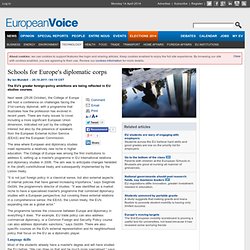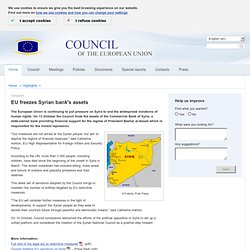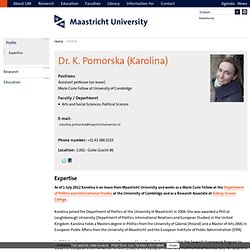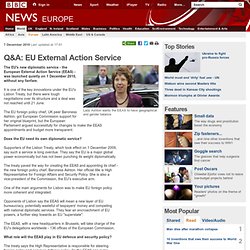

St12401-ad01.en10.pdf (application/pdf-Objekt) DasErste.de - hart aber fair - Bürger gegen Banken: Wut und Angst im Euroland. BA I - Schools for Europe's diplomatic corps. The EU's greater foreign-policy ambitions are being reflected in EU studies courses.

Next week (25-26 October), the College of Europe will host a conference on challenges facing the 21st-century diplomat, with a programme that illustrates how the profession has evolved in recent years. There are many issues to cover, including a more significant European Union dimension, indicated not just by the college's interest but also by the presence of speakers from the European External Action Service (EEAS) and the European Commission. The area where European and diplomacy studies meet represents a relatively new niche in higher education. The College of Europe was among the first institutions to address it, setting up a master's programme in EU international relations and diplomacy studies in 2006. The aim was to anticipate changes heralded in the (draft) constitutional treaty and subsequently implemented by the Lisbon treaty.
Language skills Integration © 2014 European Voice. BA I - CONSILIUM - Highlights. The European Union is continuing to put pressure on Syria to end the widespread violations of human rights.

On 13 October the Council froze the assets of the Commercial Bank of Syria, a state-owned bank providing financial support for the regime of President Bashar al-Assad which is responsible for the violent repression. © Fotolia, Floki Fotos "Our measures are not aimed at the Syrian people, but aim to deprive the regime of financial revenues," said Catherine Ashton, EU High Representative for Foreign Affairs and Security Policy. According to the UN, more than 3 000 people, including children, have died since the beginning of the unrest in Syria in March. The violent crackdown has included killing, mass arrest and torture of civilians and peaceful protestors and their relatives.
This latest set of sanctions adopted by the Council brings to nineteen the number of entities targeted by EU restrictive measures. More information: Full text of the legal act on restrictive measures (pdf) Yes No. BA I - Arab spring: an interactive timeline of Middle East protests. EFSPS People. BA I - Staff Pages. In 2011, Karolina was awarded an Intra-European Marie Curie Fellowship within the Seventh Framework Program to study the European External Action Service (EEAS) of the European Union as a multinational bureaucracy.

Her project is carried out at the Department of Politics and International Studies (POLIS) at the University of Cambridge. She is focusing on learning and socialization among diplomats. An important part of the project aims to understand the implications of establishing the EEAS in terms of democratic deficit and accountability in European Foreign Policy. Previously, Karolina had studied the roles and attitudes of officials in the Council Secretariat General of the European Union and the national diplomats in the Council of the European Union. Among her research interests are also topics such as: informal aspects of policy-making and negotiations, Polish foreign policy, the policy of the European Union towards its Eastern neighbours.
The most recent publications include: 1. BA I - EU expands Syria sanctions, moves toward oil embargo. Ablenkung - BBC News - Q&A: EU External Action Service. 7 December 2010Last updated at 17:01 Lady Ashton wants the EEAS to have geographical and gender balance The EU's new diplomatic service - the European External Action Service (EEAS) - was launched quietly on 1 December 2010, without any fanfare.

It is one of the key innovations under the EU's Lisbon Treaty, but there were tough negotiations over its structure and a deal was not reached until 21 June. The EU foreign policy chief, UK peer Baroness Ashton, got European Commission support for her original blueprint, but the European Parliament argued successfully for changes to make the EEAS appointments and budget more transparent. Does the EU need its own diplomatic service? Supporters of the Lisbon Treaty, which took effect on 1 December 2009, say such a service is long overdue. The treaty paved the way for creating the EEAS and appointing its chief - the new foreign policy chief, Baroness Ashton. One of the main arguments for Lisbon was to make EU foreign policy more coherent and integrated.